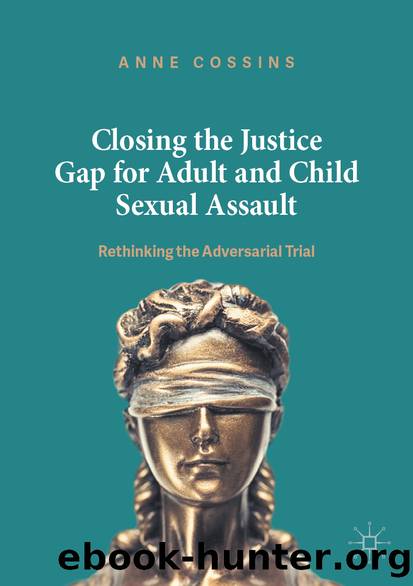Closing the Justice Gap for Adult and Child Sexual Assault by Anne Cossins

Author:Anne Cossins
Language: eng
Format: epub
ISBN: 9781137320513
Publisher: Palgrave Macmillan UK
6.2 The Position in Australia
Compared to E&W, Australia is a federal system, comprised of states and territories, with a Federal Government elected under the Australian Constitution to deal with Federal issues. Unlike E&W, Australia, does not have a Federal Bill of Rights so that Article 6 of the ECHR is not part of Federal law. Only three jurisdictions, Victoria, the Australian Capital Territory (ACT) and Queensland, have enacted Bills of Rights (Charter of Human Rights and Responsibilities Act 2006 [Vic]; Human Rights Act 2004 [ACT]; Human Rights Act 2019 [Qld]). All three contain wording that is similar to Article 6 of the ECHR.
For example, under s 25(2)(g) of the Victorian Act, a defendant in criminal proceedings has the right âto examine, or have examined, witnesses against him or her, unless otherwise provided for by lawâ, which amounts to a qualified right to examine prosecution witnesses but does not stipulate how that examination can be conducted.
Similarly, under s 22(2)(g) of the ACT Act, a defendant has a right âto examine prosecution witnesses, or have them examinedâ, although this right is not similarly qualified. While this provision also does not stipulate how that examination can be conducted, unrepresented defendants are not permitted to personally cross-examine a sexual assault complainant in the ACT, as discussed further below.
Despite the lack of a Federal Bill of Rights, it is clear from Australian common law that the rights of an accused under the fair trial principle are not absolute and are subject to âthe interests of the Crown acting on behalf of the communityâ.32 Indeed, the concept of fairness is not fixed and immutable and âmay vary with changing social standards and circumstancesâ,33 such that it is inextricably âbound up with prevailing social valuesâ.34 The concept of fairness can take into account the interests of the victim,35 including the desirable goal of encouraging victims to report sexual offences to the police, as well as minimising the re-traumatisation experienced by sexual assault complainants during the trial process and achieving best evidence. Thus, protecting complainants from re-traumatisation does not necessarily result in a reduction in the rights of an accused, rather the introduction of a fairer system of justice for all concerned, which is âmore conducive to eliciting the truthâ (Hoyano, 2015: 107).
In recent times, parliaments and other bodies have begun to accept that the right to cross-examination by the defendant is not an absolute right. For example, since September 2000 in E&W, s 34 of the YJCE Act has prohibited a defendant charged with a sexual offence from personally cross-examining a complainant.36 Similarly, s 35 prohibits a defendant charged with certain sexual offences, kidnapping, false imprisonment, abduction, slavery, human trafficking or child cruelty from personally cross-examining a child witness. In fact, the inroads into personal cross-examination by a defendant can be extended by a court in relation to other witnesses who might be affected by personal cross-examination under s 36 of the YJCE Act. Instead of personal cross-examination, s 38 allows the court to appoint a representative
Download
This site does not store any files on its server. We only index and link to content provided by other sites. Please contact the content providers to delete copyright contents if any and email us, we'll remove relevant links or contents immediately.
| Anthropology | Archaeology |
| Philosophy | Politics & Government |
| Social Sciences | Sociology |
| Women's Studies |
Cecilia; Or, Memoirs of an Heiress — Volume 1 by Fanny Burney(32548)
Cecilia; Or, Memoirs of an Heiress — Volume 2 by Fanny Burney(31947)
Cecilia; Or, Memoirs of an Heiress — Volume 3 by Fanny Burney(31932)
The Great Music City by Andrea Baker(31917)
We're Going to Need More Wine by Gabrielle Union(19034)
All the Missing Girls by Megan Miranda(15958)
Pimp by Iceberg Slim(14488)
Bombshells: Glamour Girls of a Lifetime by Sullivan Steve(14057)
For the Love of Europe by Rick Steves(13915)
Norse Mythology by Gaiman Neil(13349)
Talking to Strangers by Malcolm Gladwell(13349)
Fifty Shades Freed by E L James(13233)
Mindhunter: Inside the FBI's Elite Serial Crime Unit by John E. Douglas & Mark Olshaker(9324)
Crazy Rich Asians by Kevin Kwan(9279)
The Lost Art of Listening by Michael P. Nichols(7494)
Enlightenment Now: The Case for Reason, Science, Humanism, and Progress by Steven Pinker(7306)
The Four Agreements by Don Miguel Ruiz(6745)
Bad Blood by John Carreyrou(6611)
Weapons of Math Destruction by Cathy O'Neil(6265)
